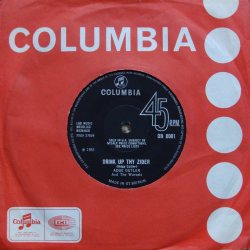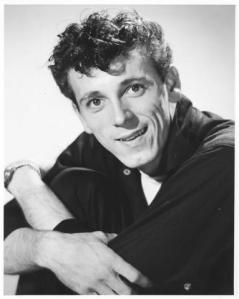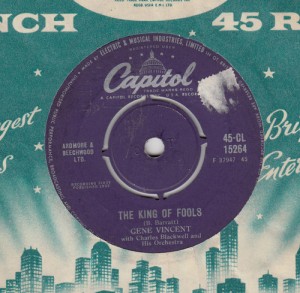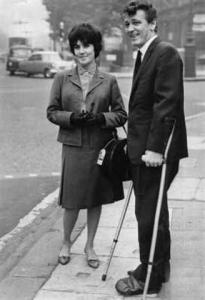We left Bob in Birmingham on a signing and recording spree.
” That was 1963 and died out in a couple of years. Then the AIR (George Martin, John Burgess and others) people left After the walk out, which came about because L.G. Wood (then EMI’s Managing Director) wouldn’t give producers a royalty, the best thing we could hope for was to work a ‘B’ side now and again, which of course we all did. We weren’t even allowed to have a publishing company strictly speaking although Norrie (Paramor) did. I was eventually allowed to have one that I called Ambleside Music, starting in 1968 but it had to be 50/50 with EMI. With Norrie it didn’t matter – he was writing a lot of songs under a multitude of names, he was paid for arranging and he was doing scores for films, as well as the pop films that were around at the time – “Live it Up”, “Play it Cool”. I don’t think the company would have stopped them doing this extra-curricular work; it enabled them to to carry on paying a small salary. Norrie had started to get sidelined into desk jobs which he didn’t particularly like. He ended up on the fifth (management) floor at Manchester Square. The marketing men were taking over – Colin Hadley and Rex Oldfield came in, Cliff Busby, tough guys and they wanted to rule the roost. There was a certain amount of disarray in the A&R department after the AIR London departure. I think Norman (Newell) and Wally (Ridley) remained aloof and tried to be their own bosses. But now all of a sudden our records were vetted; there was a meeting every week and our records were vetted by a panel and what I thought were the best records I’d ever made were turned down by people whose opinions I didn’t think were valid. On the other hand, records I never saw as being hits were big hits. “Combine Harvester” and “Edelweiss” for example. I struggled to get Vince Hill signed by EMI because they saw him as a dance band singer – he was vocalist with Bob Miller and the Millermen. I was for Vince and Norrie supported me. He had been on Pye doing comedy records. My first record for him was a Burt Bacharach songs, then “Merci Cherie”, a Eurovision song in 1964 I think. “Edelweiss” was in 1966 and that’s when I fell out with Decca marketing man Victor Stevens. I recorded it as the ‘B’ side as I fancied the other song (“A woman Needs Love”) more but everyone told me “Edelweiss” was better. It was the neglected song from “Sound of Music” and The Bachelors were going to record it but we got it out first. Victor Stevens said to me “Bob, I’ll tell you what’s wrong with this records – this is a waltz in 4/3 time”. Ever since I’ve been trying to work out what 4/3 time is! It got to No.2., kept off the top spot by “The Last Waltz” (Engelbert Humperdinck). It took me to ballad career. I did Solomon King. I went through a bad era and then got into the jokey regional acts – Adge Cutler. He was managed by a man in Bristol called John Miles who managed the Cougars in 1962 and kept in touch. He wrote to me a few years later enclosing a tape and photograph of an act that was doing very well down there – in the old fashioned wurzel gear with a horse and cart. I didn’t like the music he sent me but the group looked interesting so I organised an artist test at Abbey Road for them, and they were good. John had groomed them so perfectly for their arrival at Abbey Road that he knew they would virtually stop the traffic. They turned up in the wurzel gear on a tractor and trailer with haystacks, and Reg Quantrell, who looked like a thickie country yokel had two instruments to play – guitar and banjo. Coming to the driveway at Abbey Road they stopped work inside for the whole morning. They did the test in Studio 2 and the control room was absolutely full of the whole staff – they were just a hilarious act..so we knew we had a hit.
Initially we invited the press to a recording but couldn’t get them interested, but when we’d made a big noise with “Drink Up Thy Zyder” we did one again in Somerset. Important guests who had driven miles to be there were left outside as the place was full of locals. But I learned a lesson. I did two “live” recordings in Weston-Super-Mare and on the second one Adge blew it. He was under rehearsed, nervous and possibly drunk and it was a disaster. I realised then, when doing live comedy recordings never visit the same place twice. I learned that lesson with Max Boyce – they were all recorded in different places.
In 1970 Vic Lanza took over as my boss. He established the MOR, Easy Listening Department and had already established the Studio 2 series with which I was much involved. Decca had Phase 4 and we had Studio 2 and I probably made 25 LP’s for them. All the producers contributed – Norman did Brian Fahey and Geoff Love, George did Ron Goodwin, I did Jack Emblow (an accordionist), a Drum Spectacular with Ronnie Stephenson, Hawaiian music with Wout Steenhuis, Latin with Brian Fahey. A lot of the music I did with Alan Hawkshaw was re-released (in the 1990’s) on the Sound Gallery CD’s. We also did albums of TV jingles with Alan on keyboards – “It’s all at the Co-op now”, “The lady loves Milk Tray” – they were actually quite nice tunes. I also inherited from Norrie the semi-classical stuff – brass bands, Reginald Dixon at the Blackpool Tower Ballroom organ, The Morriston Orpheus Choir. At the time I thought “Oh, I’ve drawn the short straw here” but working with them taught me tolerance in my musical tastes and put me in good stead for today where of course the backbone of what I’m recording is MOR……..”
And there the interview ended, though earlier I had asked Bob about Gene Vincent whom he produced at the end of Gene’s career with Capitol.
“I was a rock’n’roll fanatic of course and working with him was working with one of my heroes. He was never well – he’d had a motor cycle accident by then, but he was very quiet and had the demeanor of many of the jazzmen of those days. I think he moved here in 1963 because of a woman who lived in Streatham called Sherri Ann.”
(A Google search reveals that Sherri Ann was in fact the daughter from his third marriage, indeed to a Streatham girl called Margaret Russell Griffith. They married on January 23, 1963 and Sherri Ann was born on May 29 – see the photograph and an extraordinary news story by Daily Mirror show business writer Don Short from the same year)
(DAILY MIRROR)
(24 September 1963)

By DON SHORT
AMERICAN pop singer Gene Vincent, 28, talked last night of love and jealousy – and of the night he accused his London-born wife at gunpoint of having an affair.
Earlier, Gene had been fined £20 at London’s Marylebone Court for possessing two pistols and ammunition without a licence.
He was given a conditional discharge for a year on a charge of threatening his 28-year-old wife with a Luger pistol.
Gene and Margaret, pictured above, later kissed and made-up before going, hand-in-hand, to a BBC recording session.
Gene, real name Gene Vincent Craddock, told me: “The trouble began last week when I was in Hamburg. Friends told me of rumours linked with Margaret when we were last there.
“When I came back to London I questioned her. I felt as savage as any man can when he hears about such a thing.
Explaining that he had two guns, one a Luger, “knocking about” his flat in Notting Hill, Gene went on:
“But I could never have pulled the trigger. I could never have murdered her. I love her too much. I did it just to scare her.
“Now I know the rumours about her are untrue. Margaret is innocent-and she has forgiven me for my fit of jealousy.”
(quoted in full)
“We did quite a few singles and at least one album with The Shouts, a British band who toured with him. That was mostly rock standards but for the singles we did news songs, three were mine. The first one “King of Fools” was on Capitol, a small hit that still earns money.”
“I’ll move on to Gerry Bron next. Meanwhile, if you can add anything to the information in this interview, please do so. If you want to do this via Facebook, I hope you’ll let me copy the information to the Word Press comments page. Or, you can go into Word Press, search Vinyl Memories, and add your comments there. You can also see all my previous ramblings. Finally, one thing that is missing is a photograph of Bob, which Google has failed to find. Anyone have one?
©David Hughes, 2015 (text only)





Most of those mentioned are before my (Our) time apart from Vic Lanza who I didn’t know was Bob’s boss maybe he wasn’t by 1976. Rex Oldfield I only know as a name on tons of old correspondence that Gordon Frewin had at Motown I’m sure Alan will know more. Surely there might be a photo of Bob somewhere in Janet Lord’s old archive at Hayes which you surely have access to?
LikeLike
Agree there will be photos in the archive, Bob, but I’m simply ‘borrowing’ shots via Google to illustrate and when I searched for Bob B there were dozens offered but none were of him!
LikeLike
Gene Vincent had a flat in Notting Hill? Anyone know where?
LikeLike